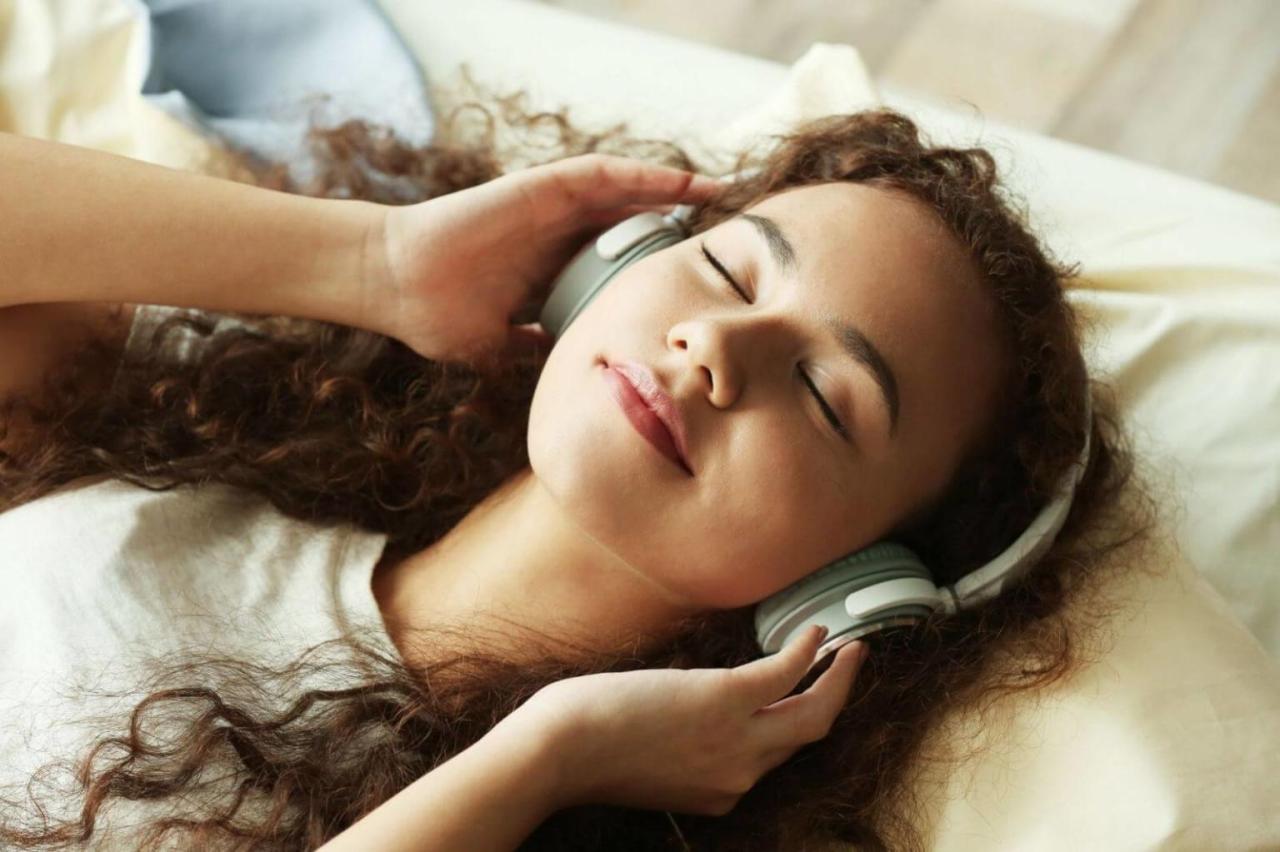
Could Music Be The Secret To Your Best Sleep?
Could music be the secret to your best sleep? It might sound like a far-fetched idea, but there’s a growing body of scientific evidence suggesting that music can significantly impact our sleep quality. From calming melodies to rhythmic beats, music has the power to influence our brainwaves, regulate our heart rate, and even alter our sleep cycles.
This article delves into the fascinating world of music and sleep, exploring the scientific basis behind its influence, the therapeutic benefits of music for sleep disorders, and practical tips for creating your own personalized sleep soundtrack. We’ll also discuss how music can work in conjunction with other environmental factors to create a sleep-conducive environment.
The Science Behind Music and Sleep

The idea of using music to improve sleep might seem like a modern fad, but the relationship between music and sleep has been recognized for centuries. Ancient cultures used lullabies and soothing sounds to calm children and induce sleep. Today, scientific research is revealing the powerful physiological effects of music on the brain, particularly in areas related to sleep regulation.
The Physiological Effects of Music on the Brain
Music influences the brain’s activity in several ways, directly impacting sleep regulation. Music activates the auditory cortex, triggering a cascade of neurological responses that influence various brain regions. * The Reticular Activating System (RAS):This brain network plays a crucial role in regulating arousal and wakefulness.
Music can modulate the RAS, promoting relaxation and reducing anxiety, making it easier to fall asleep.
The Limbic System This system is involved in processing emotions, memory, and motivation. Music evokes emotional responses, triggering the release of neurotransmitters like dopamine and serotonin, which can promote feelings of calm and well-being, leading to improved sleep quality.
The Hypothalamus This brain region regulates the body’s internal clock (circadian rhythm) and hormone production. Music can synchronize the brain’s rhythms with external cues, such as a calming melody before bedtime, promoting a more regular sleep-wake cycle.
The Autonomic Nervous System Music can influence the sympathetic and parasympathetic branches of the autonomic nervous system, responsible for controlling involuntary functions like heart rate, breathing, and blood pressure. Soothing music can slow heart rate, reduce blood pressure, and induce a state of relaxation, facilitating sleep onset.
Music Genres and Sleep Stages
Different music genres and tempos can influence specific sleep stages and overall sleep quality.* Slow Tempo Music:Music with a tempo of 60-80 beats per minute (BPM) is often associated with relaxation and sleepiness. This tempo aligns with the brain’s natural rhythm during deep sleep, promoting a deeper and more restorative sleep.
Classical Music Classical music, especially with slow tempos and simple melodies, can create a calming atmosphere and reduce stress, making it easier to fall asleep.
Nature Sounds
You know how they say a good night’s sleep is crucial for weight loss? Well, it’s not just about the hours, but the quality of your sleep too. And while calming music can definitely help you drift off, remember that weight loss is also influenced by hormones like leptin, ghrelin, and cortisol, which you can learn more about in this article: 3 Hormones to Keep in Mind for Weight Loss.
So, if you’re serious about losing weight, prioritize your sleep, listen to soothing music, and keep those hormones in check!
Ambient Music This genre, characterized by atmospheric soundscapes and minimal melodies, can create a calming and meditative environment, ideal for inducing sleep.
You know how they say a good night’s sleep is the key to a healthy lifestyle? Well, maybe music is the secret to unlocking that sleep! It’s all about creating the right atmosphere, and sometimes, that means incorporating a bit of mindful eating into your routine.
Check out this guide to High Fiber Meals for Weight Loss: A Guide to Feeling Full and Slim , which can help you feel your best before you drift off to dreamland. After all, a relaxed body and mind are essential for a good night’s rest!
Scientific Evidence of Music’s Impact on Sleep
Numerous studies have demonstrated the positive impact of music on sleep duration and quality.* A study published in the journal “Sleep Medicine”found that listening to calming music before bedtime significantly improved sleep quality, reducing sleep latency (time to fall asleep) and increasing sleep duration.
- Another study, published in the journal “Psychophysiology,”showed that listening to music with a slow tempo and low pitch during sleep reduced nighttime awakenings and improved overall sleep quality.
- Research conducted by the University of Oxforddemonstrated that listening to music with a tempo of 60-80 BPM during sleep significantly increased the amount of time spent in slow-wave sleep, the deepest and most restorative stage of sleep.
Music Therapy for Sleep Disorders: Could Music Be The Secret To Your Best Sleep
Music therapy is a growing field that utilizes the power of music to address various health concerns, including sleep disorders. This approach leverages the therapeutic benefits of music to improve sleep quality, reduce reliance on medications, and enhance overall well-being.
Types of Music Interventions in Sleep Therapy
Music therapy for sleep disorders encompasses a variety of interventions, each tailored to address specific sleep challenges. These interventions aim to induce relaxation, reduce anxiety, and promote restful sleep.
- Guided Meditations:Guided meditations involve listening to recordings that guide individuals through relaxation techniques and visualizations. These meditations often incorporate calming music, nature sounds, and positive affirmations to promote relaxation and reduce racing thoughts.
- Ambient Soundscapes:Ambient soundscapes create a soothing auditory environment that masks distracting noises and promotes a sense of calm. These soundscapes often feature natural sounds like rain, ocean waves, or gentle wind, combined with soft instrumental music or nature recordings.
- Binaural Beats:Binaural beats are created by playing two slightly different frequencies of sound, one in each ear. When these frequencies are processed by the brain, they create a third, “binaural” beat that can induce relaxation and promote sleep. Studies suggest that binaural beats may help regulate brainwave activity, reducing anxiety and improving sleep quality.
Benefits of Music Therapy for Sleep Disorders
Music therapy offers numerous benefits for individuals struggling with sleep disorders, including:
- Improved Sleep Quality:Music can help regulate sleep-wake cycles, reduce sleep latency (time it takes to fall asleep), and increase sleep duration. By inducing relaxation and reducing stress, music can create a more conducive environment for restful sleep.
- Reduced Reliance on Medications:Music therapy can serve as a non-pharmacological approach to managing sleep disorders, reducing the need for sleep medications with their potential side effects. It can be used as a complementary therapy alongside medication or as a standalone treatment for mild to moderate sleep problems.
- Reduced Anxiety and Stress:Music can have a calming effect on the nervous system, reducing anxiety and stress levels that often contribute to sleep difficulties. By creating a sense of peace and tranquility, music can promote relaxation and improve sleep quality.
Creating Your Personalized Sleep Soundtrack

Crafting a personalized sleep playlist is like creating a tailored lullaby that soothes your mind and body into a peaceful slumber. It’s an art of curating the right soundscapes, rhythms, and melodies to create an optimal environment for relaxation and sleep.
Choosing the Right Music Genres
The genre of music you choose can significantly impact your sleep experience. Some genres are known for their calming and relaxing qualities, while others might be too stimulating for bedtime. Here’s a table outlining some popular genres and their potential effects on sleep:
| Genre | Potential Effects on Sleep | Examples |
|---|---|---|
| Classical Music | Promotes relaxation, reduces anxiety, and improves sleep quality. | Mozart, Bach, Beethoven |
| Ambient Music | Creates a peaceful and serene atmosphere, ideal for falling asleep. | Brian Eno, Aphex Twin, Boards of Canada |
| Nature Sounds | Mimics natural environments, promoting calmness and reducing stress. | Rain, ocean waves, forest sounds |
| Slow Jazz | Provides a mellow and sophisticated ambiance, ideal for unwinding. | Miles Davis, John Coltrane, Chet Baker |
| World Music | Offers a diverse range of sounds and rhythms, fostering a sense of peace and tranquility. | Indian Ragas, Celtic Harp Music, Japanese Koto Music |
Tempo and Rhythm
The tempo of music, measured in beats per minute (BPM), plays a crucial role in sleep. Generally, slower tempos between 60-80 BPM are considered most conducive to relaxation and sleep.
“Music with a tempo of 60-80 BPM tends to synchronize with our heart rate and breathing, promoting a sense of calm and relaxation.”
Artist Recommendations
While personal preferences play a significant role, here are some artists known for their calming and sleep-inducing music:
- Enya: Known for her ethereal vocals and enchanting melodies.
- Max Richter: Creates minimalist and atmospheric music that promotes deep relaxation.
- Ludovico Einaudi: Renowned for his piano compositions that evoke a sense of peace and tranquility.
- Johann Sebastian Bach: His Baroque compositions are often used in music therapy for their calming effects.
Beyond Music
While music plays a crucial role in creating a sleep-conducive environment, it’s just one piece of the puzzle. A truly optimal sleep environment encompasses several factors that work in harmony to promote restful slumber.
The Importance of a Conducive Sleep Environment
A conducive sleep environment goes beyond just music and encompasses various aspects that directly impact your sleep quality. These factors work together to create a soothing and relaxing atmosphere, preparing your body and mind for restful sleep.
Room Temperature
Maintaining a comfortable room temperature is essential for sleep. Research suggests that the ideal temperature for sleep is between 60 and 67 degrees Fahrenheit (15.5 to 19.4 degrees Celsius).
Ever wonder if music could be the secret to your best sleep? It might be! After all, a good night’s rest is crucial for overall health, including weight management. And speaking of weight management, you might find some helpful tips in this article on 10 Simple Changes That Lead to Weight Loss.
Once you’ve got your weight goals on track, consider how music can help you unwind and get those restful hours you deserve.
“A cool bedroom can help you fall asleep faster and stay asleep longer,” says Dr. Michael Breus, a board-certified sleep specialist.
A slightly cooler temperature helps regulate your body temperature, promoting sleepiness. Too warm a room can make it difficult to fall asleep, while a cold room can lead to shivering and discomfort.
Lighting
Light plays a crucial role in regulating your body’s natural sleep-wake cycle, known as the circadian rhythm. Exposure to bright light during the day helps suppress melatonin, the hormone that promotes sleepiness. Conversely, reducing light exposure in the evening allows your body to naturally produce melatonin, preparing you for sleep.
- Dim the lights in your bedroom a few hours before bedtime to signal to your body that it’s time to wind down.
- Avoid using electronic devices like phones, tablets, and laptops in the hour before bed, as their blue light can interfere with melatonin production.
- Consider using blackout curtains to block out any external light sources.
Noise Levels
A quiet and peaceful environment is essential for sleep. Excessive noise can disrupt your sleep cycle, leading to light sleep, frequent awakenings, and reduced sleep quality.
- Consider using earplugs or a white noise machine to block out any distracting noises.
- If you live in a noisy area, try to schedule your sleep during quieter hours.
- Minimize noise within your home, especially in the evening, by avoiding loud conversations, TV, or music.
Creating a Relaxing and Calming Bedroom Atmosphere
Beyond temperature, light, and noise, there are other factors that can contribute to a relaxing and calming bedroom atmosphere:
- Aromatherapy:Certain scents, like lavender and chamomile, are known to have calming and relaxing effects. You can use essential oils in a diffuser or add a few drops to your bath.
- Comfortable Bedding:Invest in high-quality bedding that is soft, breathable, and comfortable. A comfortable mattress and pillows are essential for a good night’s sleep.
- Minimal Clutter:A cluttered bedroom can create a sense of chaos and stress, making it difficult to relax and fall asleep. Keep your bedroom tidy and free of clutter.
Music and the Mind-Body Connection

Music has an undeniable power to evoke emotions, and this emotional connection is deeply intertwined with our physical well-being, particularly our sleep. Understanding this mind-body connection is crucial to harnessing the therapeutic potential of music for sleep improvement.
The Emotional Influence of Music on Sleep, Could music be the secret to your best sleep
Music’s ability to influence our mood and emotional state is well-established. Whether it’s the calming effect of classical melodies or the energizing rhythm of upbeat pop, music can shift our emotional landscape, impacting our sleep patterns.
“Music can be a powerful tool for regulating emotions and promoting relaxation, both of which are essential for healthy sleep.”Dr. Barbara Thompson, Sleep Specialist
- Stress Reduction:Calming music can lower cortisol levels, the stress hormone, leading to a more relaxed state conducive to sleep.
- Mood Enhancement:Uplifting music can elevate mood and combat feelings of sadness or anxiety, creating a more positive mental environment for sleep.
- Emotional Processing:Music can serve as a cathartic outlet, allowing us to process emotions and anxieties, fostering a sense of emotional equilibrium before sleep.
Case Studies and Personal Anecdotes
Numerous case studies and personal experiences highlight the profound impact of music on sleep. For instance, a study published in the journal “Sleep Medicine” found that listening to calming music before bed significantly improved sleep quality and reduced insomnia symptoms in participants.
Many individuals have reported personal anecdotes about how specific musical genres or pieces have helped them fall asleep more easily or sleep more soundly. For example, a patient suffering from chronic insomnia found solace in listening to nature sounds and ambient music, experiencing a dramatic improvement in their sleep quality.
These examples underscore the powerful connection between music and sleep, demonstrating how music can act as a bridge between our emotional state and our physical well-being, paving the way for better sleep.
Final Thoughts
The connection between music and sleep is a complex and fascinating one, offering a natural and often overlooked approach to improving our sleep quality. By understanding the science behind music’s impact, embracing music therapy techniques, and creating a personalized sleep soundtrack, we can harness the power of music to unlock the potential for more restful and rejuvenating sleep.






